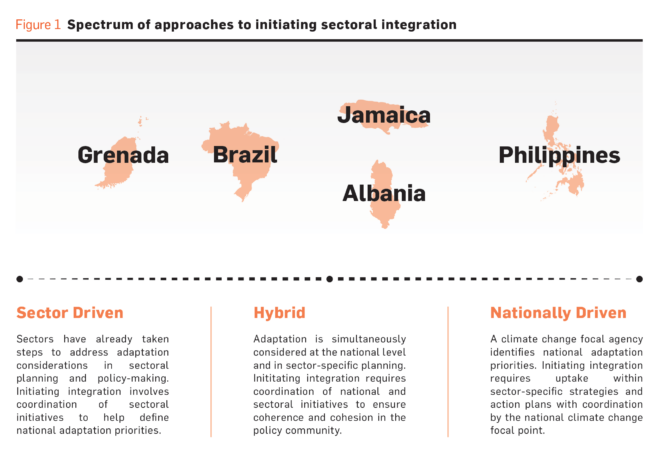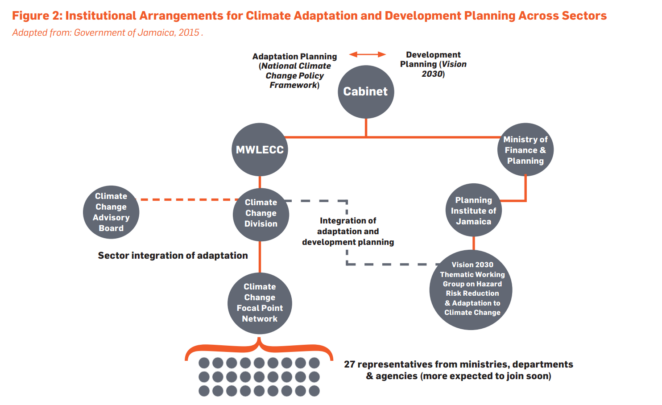sNAPshot: Jamaica’s Approach to Initiating Sector Integration of Adaptation Considerations

Introduction
No single approach to integrating climate adaptation considerations into sector planning exists. However, concrete examples are emerging as more countries pursue NAP processes. South-South sharing of experiences through the NAP Global Network has shown that in the early stages of NAP processes, the impetus for sector integration can be found in different ministries and at different levels depending on the country context. A spectrum of approaches to initiating sector integration of climate adaptation is emerging, ranging from sector-driven to nationally driven approaches.
Building on an earlier overview brief, this sNAPshot takes a closer look at how Jamaica initiated sectoral integration of climate adaptation considerations, and how this compares with approaches that other countries are taking.
Climate change and development in Jamaica
A small, mountainous Caribbean island, Jamaica’s national development and key sectors are highly vulnerable to the impacts of climate change, including sea-level rise, droughts, coastal erosion, and increasing temperatures. The country’s economy is highly dependent on service industries, including tourism, which account for more than 70 per cent of Jamaica’s GDP. Agriculture accounts for another 7 per cent. Meanwhile, Jamaica’s Climate Change Policy Framework (2015) identifies the following as the sectors most vulnerable to climate change:
- Coastal and marine resources
- Water resources
- Human settlements and infrastructure
- Agriculture
- Tourism
- Human health
- Energy
Both Jamaica’s national development plan, Vision 2030, and Jamaica’s Climate Change Policy Framework recognize the importance of integrating adaptation considerations across these vulnerable sectors to ensure climate-resilient development.
Plans and Strategies for Climate Adaptation and Development
Over the past decade, the Government of Jamaica has started to understand climate change as a national development challenge that concerns all sectors of the economy, rather than as a strictly environmental issue. Jamaica’s first long-term National Development Plan, Vision 2030, includes a focus on “hazard risk reduction and adaptation to climate change” as one of its 15 national outcomes. The plan, which aims to transform Jamaica from a middle-income country to a developed country by 2030, intends “to provide the framework to ensure that climate change issues are mainstreamed into national policies and development activities.” The Plan includes the objective to “create mechanisms to fully consider the impacts of climate change and “climate proof’’ all national policies and plans.” A National Climate Change Policy Framework was also approved by the Government of Jamaica in late 2015.
Both Vision 2030 and Jamaica’s National Climate Change Policy Framework call for the development of sector-specific climate change strategies for Jamaica’s most vulnerable sectors. Therefore, at the sector level initiatives are already underway to develop climate change strategies and action plans. Some sectors, such as agriculture, are developing stand-alone climate change strategies or action plans with the aim of later integrating them into their overall sector strategies. Others, such as the forestry sector, are taking advantage of ongoing updates to existing sector plans or strategies to directly integrate adaptation within them. The adaptation priorities and approaches taken by these vulnerable sectors are later expected to be merged into a national adaptation strategy and action plan.
Jamaica is therefore an example of a hybrid approach to initiating sector integration: Vision 2030 identifies addressing climate risks as a national development priority, calling for efforts by vulnerable sectors to begin their own adaptation planning. In turn, the strategies that vulnerable sectors are now developing will feed into a national adaptation strategy and action plan.

Institutional Arrangements for Climate Adaptation and Development Planning Across Sectors
The Planning Institute of Jamaica (PIOJ), a national agency of the Ministry of Finance and Planning (MOFP), has played a central role in ensuring that climate change is treated as a national development priority and cross-sector issue. The PIOJ has the mission to lead policy formulation on economic and social issues to achieve sustainable development, and is the National Technical Secretariat for Vision 2030 Jamaica. The PIOJ is responsible for coordinating all development efforts under Vision 2030 and for monitoring and evaluating results. It oversees Thematic Working Groups on each of Vision 2030’s outcomes, including the one on Hazard Risk Reduction and Adaptation to Climate Change. Jamaica has also established an institutional coordination structure for addressing climate change.
A new Ministry of Water, Land, Environment and Climate Change (MWLECC) was established in 2012. In 2013, a Climate Change Division (CCD) was founded under MWLECC to coordinate climate change activities across sectors. CCD also collaborates with the Vision 2030 working group on Hazard Risk Reduction and Adaptation to Climate Change to support integration of adaptation considerations into development planning. A Climate Change Focal Point Network established in March 2014 is presently composed of 27 focal points drawn from all government ministries and selected government departments and agencies. This number is set to increase in the near future when focal points from additional agencies and local government organizations will be appointed. These focal points are expected to report regularly to the CCD and are responsible for supporting the integration of climate adaptation planning at the sectoral level. Finally, although not currently active, a Climate Change Advisory Board is envisioned to provide scientific and technical advice to the CCD and the Minister, with representation from across sectors, academia, and the private sector.
Figure 2 illustrates the institutional arrangements that are in place and the levels at which integration of climateadaptation into sector and development planning takes place.

Coordinating Donor Support for Adaptation Across Sectors
Donors working in Jamaica have to align their support with Vision 2030, which includes addressing climate risk as a priority, and the climate change policy framework. PIOJ’s External Cooperation Management and Project Development Department reviews donors’ country strategies and projects to be funded. In principle, requests for funding from any ministry must also first go through this department, although coordination meetings are often held between specific sector ministries and development partners on an as-needed basis.
At the time of writing, the development of sector-specific climate change strategies and action plans is expected to be supported by three different donors: USAID; the Climate Investment Fund through the Inter-American Development Bank/World Bank under the Pilot Program for Climate Resilience (PPCR), and the European Union through the Caribbean Community Climate Change Centre (5Cs). Coordination among these donors as well as interministerial coordination will be crucial to the successful integration of adaptation into these sector strategies, and alignment with overall development priorities.
Webinar on Sector Integration in the NAP Process in Jamaica
Suggested Citation
Dekens J. and Price-Kelly, H. (2016) Jamaica’s Approach to Initiating Sector Integration of Adaptation Considerations. sNAPshot Policy Briefs: Country Brief 1A. International Institute for Sustainable Development for the NAP Global Network. Retrieved from http://napglobalnetwork.org/resource/snapshot-jamaicas-approach-to-initiating-sector-integration-of-adaptation-considerations/
References and Further Reading
- Central Intelligence Agency (CIA). (2016). The world factbook: Jamaica. Retrieved from https://www.cia.gov/library/publications/theworld-factbook/geos/jm.html
- Deutsche Gesellschaft für Internationale Zusammenarbeit (GIZ) GmbH. (forthcoming 2016). Institutional Context Analyses for National Climate Adaptation Planning Processes: Lessons from Jamaica, Kenya and Togo. (GIZ) GmbH.
- Government of Jamaica. (2009). Vision 2030 Jamaica: National Development Plan. Retrieved from http://www.vision2030.gov.jm/ National-Development-Plan
- Government of Jamaica. (2015). Climate Change Policy Framework for Jamaica. Retrieved from http://www.mwh.gov.jm/Library/ Public/Climate%20Change/Climate%20Change%20Policy%20 Framework%20Final.pdf
Related resources
- Read the Overview Brief: Initiating sector integration of adaptation considerations
- Case Study: Grenada’s approach to initiating sector integration of adaptation considerations
- Case Study: Philippines’s approach to initiating sector integration of adaptation considerations
- Read more about how NAP Global Network are supporting national level action on NAP development and implementation
- Discover CDKN’s Caribbean Programme and related news and resources
- Learn more about the Caribbean and the SDGs on IISD's SDG Knowledge Hub
(0) Comments
There is no content